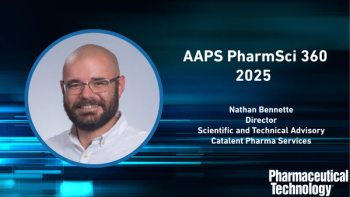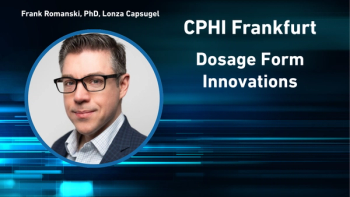
- Pharmaceutical Technology-03-02-2015
- Volume 39
- Issue 3
Industry Expert Q&A with Richard Grant
Richard Grant, Global VP of Cell Therapy at Invetech discusses the advantages and challenges of developing and manufacturing personalized immunotherapies.
Richard Grant, Global VP, Cell Therapy, Invetech
PharmTech: What are the advantages to developing personalized immunotherapies for patients?
Grant: Specificity and safety. Should the therapy work, then the treatment is produced to target that patient’s individual condition. The cells treating the patient are from the patient so there is no chance of rejection or of receiving something unexpected from another donor’s cells.
PharmTech: What are some of the challenges?
Grant: Challenges include creating a business model to achieve a commercially acceptable cost-per-dose; determining who will pay and how much they will pay; managing logistics for incoming materials (e.g., temperature [fresh, cold, or frozen], distance traveled, timing of both taking and delivering a sample, and location of the plant [single versus multiple locations]); managing the production process flow; the logistics for outgoing materials; capital cost; and ensuring the facility design matches the manufacturing process and equipment. Matching facility design to the manufacturing design and equipment hasn’t been done yet, so templates for facility design do not exist and custom equipment is not available or in production for therapies of this type.
PharmTech: How do you foresee the future of patient-specific therapies affecting the production of personalized immunotherapies?
Grant: If diagnostic testing supported by small molecule-based or other patient-specific therapies becomes widespread, safe, and effective, they would likely be cheaper than personalized immunotherapies to produce and therefore could threaten the viability of personalized immunotherapies. Alternatively, if patient-specific therapies become more widespread and recognized, but not dramatically better, then the uptake of personalized immunotherapies could be accelerated. As more personalized immunotherapies gain approval, reimbursement, recognition, and when they are more easily manufactured, they will become more available. These factors will also accelerate their uptake.
PharmTech: What are the biggest challenges when manufacturing personalized immunotherapies?
Grant: Operators require qualifications in science with complementary lab skills, including training to work in cleanrooms, and must be able to perform complex manual manipulations and material transfers in a sterile environment. The ability to maintain focus, high levels of concentration coupled with dexterity, and above all, consistency in performance are required. With an industrialized process and automated equipment, we can match the operator required skill set more appropriately to the manual tasks of production and the supervisor level skill sets to the task of monitoring quality process output and recovery steps (if needed).
Article DetailsPharmaceutical Technology
Vol. 39, No. 3
Page: 78
Citation: When referring to this article, please cite it as “Industry Expert Q&A with Richard Grant,” Pharmaceutical Technology39 (3) 2015.
Articles in this issue
almost 11 years ago
Vaccine Development and Production Challenges Manufacturersalmost 11 years ago
Europe Strives for a More Efficient Generic-Drug Approval Frameworkalmost 11 years ago
Kason Offers Screen Replacementalmost 11 years ago
GEA Homogenizer Offers Scalabilityalmost 11 years ago
PolyScience Chiller and Circulator Enhances Temperature Controlalmost 11 years ago
Ross Control System Increases Consistencyalmost 11 years ago
Managing Supplier Data Collectionalmost 11 years ago
The Global Biomanufacturing Outsourcing Marketalmost 11 years ago
Lyophilization Cycle Optimization of Cell-Derived Productsalmost 11 years ago
Minimizing Risk during HPAPI ManufactureNewsletter
Get the essential updates shaping the future of pharma manufacturing and compliance—subscribe today to Pharmaceutical Technology and never miss a breakthrough.




